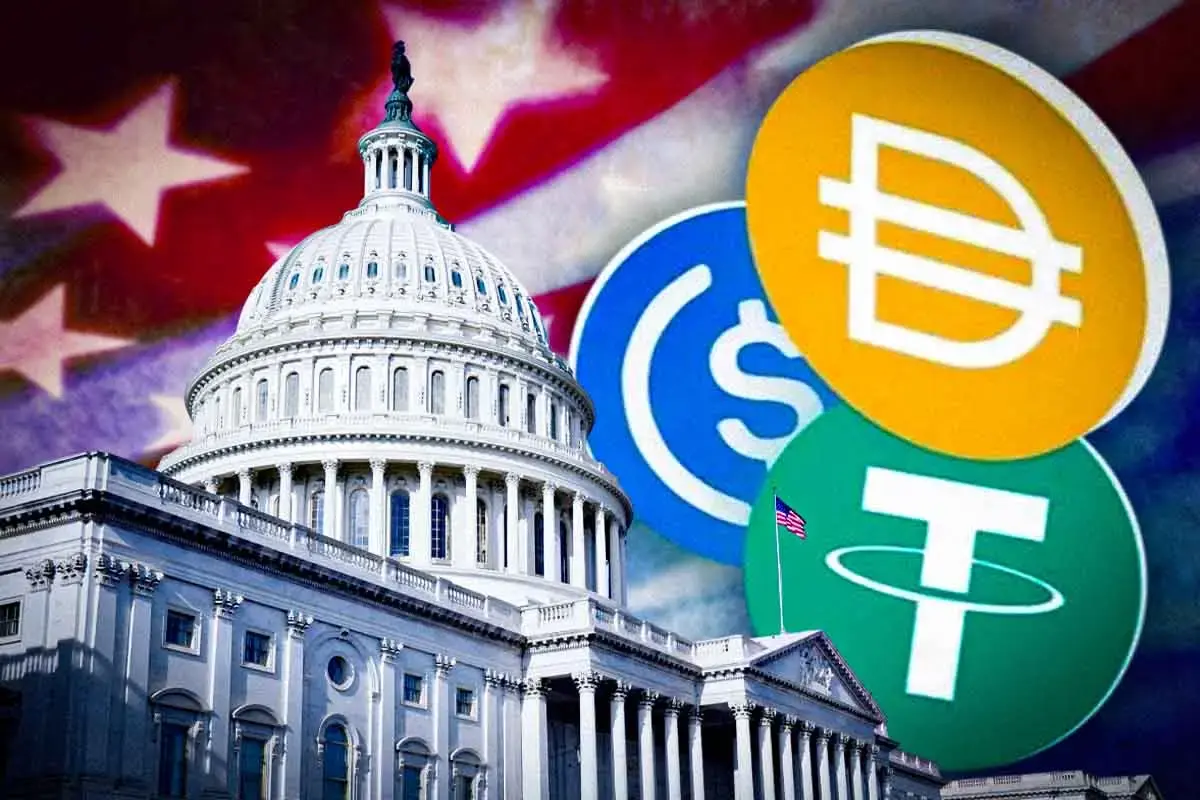
Key Takeaways
- Stablecoin regulation in the U.S. reached a turning point in June 2025 when the Senate passed the GENIUS Act (Guiding and Establishing National Innovation for U.S. Stablecoins Act) with bipartisan support.
- The legislation establishes a federal framework for overseeing stablecoins, currently a $250 billion market, by ensuring stability, transparency, and consumer protection.
- Stablecoins have become critical to the crypto ecosystem, with transaction volumes surpassing $28 trillion in 2024, exceeding Visa and Mastercard combined.
- The Act requires full reserve backing, monthly audits, AML/KYC compliance, and consumer protections to build trust and reduce risks in the stablecoin market.
- The GENIUS Act contrasts with the STABLE Act, especially on regulatory authority, yield restrictions, and federal vs. state regulation approaches.
- The legislation has sparked political debate but is widely embraced by industry players as a step toward mainstream adoption and regulatory clarity.
The GENIUS Act marks a turning point in stablecoin regulation, establishing federal oversight by the U.S. Treasury and imposing strict requirements on issuers. This legislation aims to foster innovation while protecting consumers, addressing the explosive growth and systemic risks of stablecoins like USDT, USDC, and BUSD.
Understanding Stablecoins
Stablecoins are cryptocurrencies pegged to stable assets, typically the U.S. dollar, reducing price volatility common in assets like Bitcoin (BTC) and Ethereum (ETH). Examples include Tether (USDT), USD Coin (USDC), and Binance USD (BUSD). They facilitate efficient transactions across trading platforms, remittances, and DeFi applications, acting as a vital bridge between traditional finance and blockchain ecosystems.
With 99% of stablecoins pegged to the dollar, their transaction volumes surpassed $28 trillion in 2024, outpacing traditional payment networks. This unprecedented growth highlights both their potential to reshape finance and the urgent need for clear regulation to mitigate risks of misuse and consumer harm.

Key Provisions of the GENIUS Act
- Federal Oversight: The U.S. Treasury Department assumes regulatory authority, creating uniform federal standards that preempt conflicting state laws.
- Full Reserve Requirements: Stablecoin issuers must maintain 1:1 backing with highly liquid assets, such as U.S. Treasury securities, ensuring redeemability.
- Monthly Audits: Independent third-party audits verifying reserve adequacy and compliance must be conducted monthly and publicly disclosed.
- AML/KYC Compliance: Issuers must enforce anti-money laundering and know-your-customer regulations to prevent illicit activity.
- Consumer Protections: Stablecoins must be redeemable at par, with prohibitions on misleading practices harmful to consumers.
These measures aim to bolster trust in stablecoins while addressing risks exemplified by previous crypto failures.
Comparison with the STABLE Act
Alongside the GENIUS Act, the House is reviewing the STABLE Act, which differs notably in several areas:
- Regulatory Authority: The GENIUS Act assigns oversight to the U.S. Treasury, while the STABLE Act distributes it among the Federal Reserve, OCC, and other agencies.
- Yield Restrictions: The GENIUS Act places no explicit ban on yield generation by stablecoins; the STABLE Act prohibits consumer stablecoins from generating yield, limiting some business models.
- Federal vs. State Regulation: The GENIUS Act preempts state laws to establish a single federal standard, whereas the STABLE Act allows for dual federal-state regulation.
Reconciling these differences will be crucial as the legislative process continues.
Political Context and Controversies
The GENIUS Act’s passage triggered political debate. Critics raised concerns about potential conflicts of interest linked to former President Donald Trump’s crypto holdings and token sales. Amendments aimed at addressing such concerns were blocked, fueling allegations of industry favoritism. The crypto sector’s $25 million lobbying efforts in 2024 intensified scrutiny over possible undue influence favoring industry growth over consumer protection.
Supporters argue the legislation is essential for legitimizing stablecoins and integrating them with mainstream finance. The bipartisan Senate vote reflects broad consensus on the need for regulation despite political tensions. The bill’s journey in the House, which may involve amendments or a merger with the STABLE Act, remains uncertain.
Industry Reactions and Market Impact
Industry players widely welcome the GENIUS Act for providing regulatory clarity. Major companies like Shopify have integrated stablecoin payments through Coinbase and Stripe. Large banks such as Bank of America and JPMorgan (which launched JPMD on Coinbase’s Base blockchain) are exploring stablecoin issuance, signaling growing traditional finance engagement.
Analysts predict the stablecoin market could reach $1.6 trillion in five years, fueled by regulatory certainty and increased adoption. This expansion may disrupt traditional banking by offering faster, cheaper payment alternatives. However, strict audit requirements could increase costs for smaller issuers, potentially favoring larger entities.
Global Implications
The GENIUS Act could cement the U.S.’s leadership in digital finance, influencing global standards. Similar initiatives like the European Union’s MiCA regulation seek to balance innovation and oversight. Yet, stringent rules risk pushing innovation to jurisdictions with more lenient regulations, such as Singapore or Dubai. The global regulatory landscape will determine where crypto innovation thrives, with the GENIUS Act playing a pivotal role.
Future Outlook
Should the GENIUS Act become law, it will likely transform the stablecoin landscape by fostering trust, encouraging adoption, and mitigating risks. Its success depends on approval by the House and possible harmonization with the STABLE Act. Beyond the U.S., the bill may prompt policy alignment or competition among nations.
The legislation also highlights crypto’s evolving integration with traditional finance. As major retailers explore stablecoin payments and industry events emphasize stablecoins, digital and fiat currencies continue to converge. The GENIUS Act is a crucial step toward seamless global adoption of cryptocurrencies.
The Road Ahead: Why the GENIUS Act Matters for Crypto’s Future
The GENIUS Act represents a landmark in stablecoin regulation, establishing a framework to unlock their potential while managing risks. Its provisions: federal oversight, full reserves, audits, and AML/KYC compliance, seek to protect consumers and stabilize markets. Political debates and differences with the STABLE Act illustrate the complexity of regulating a rapidly evolving sector. As the legislation advances, its impact on innovation, market growth, and global finance will be closely observed. For now, the GENIUS Act signals a bold move toward a regulated and mainstream crypto future.






